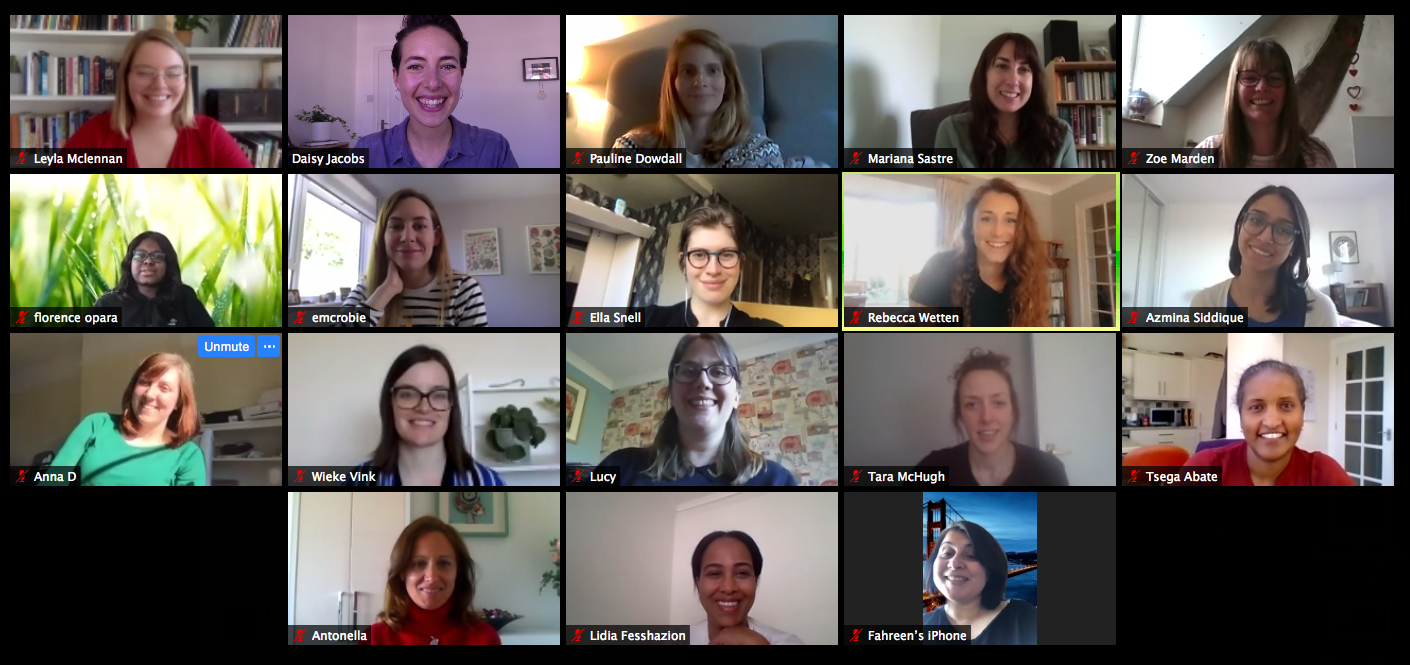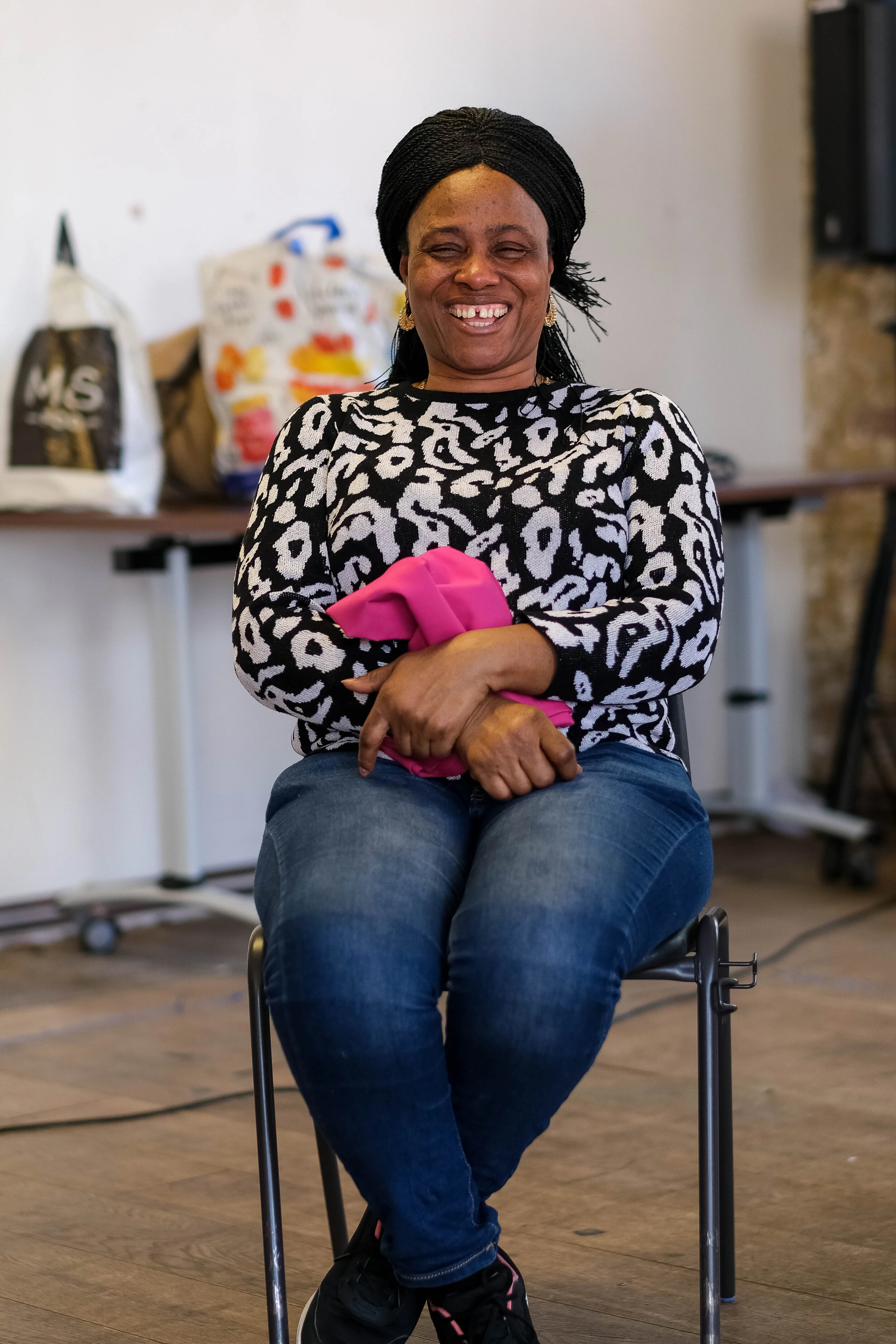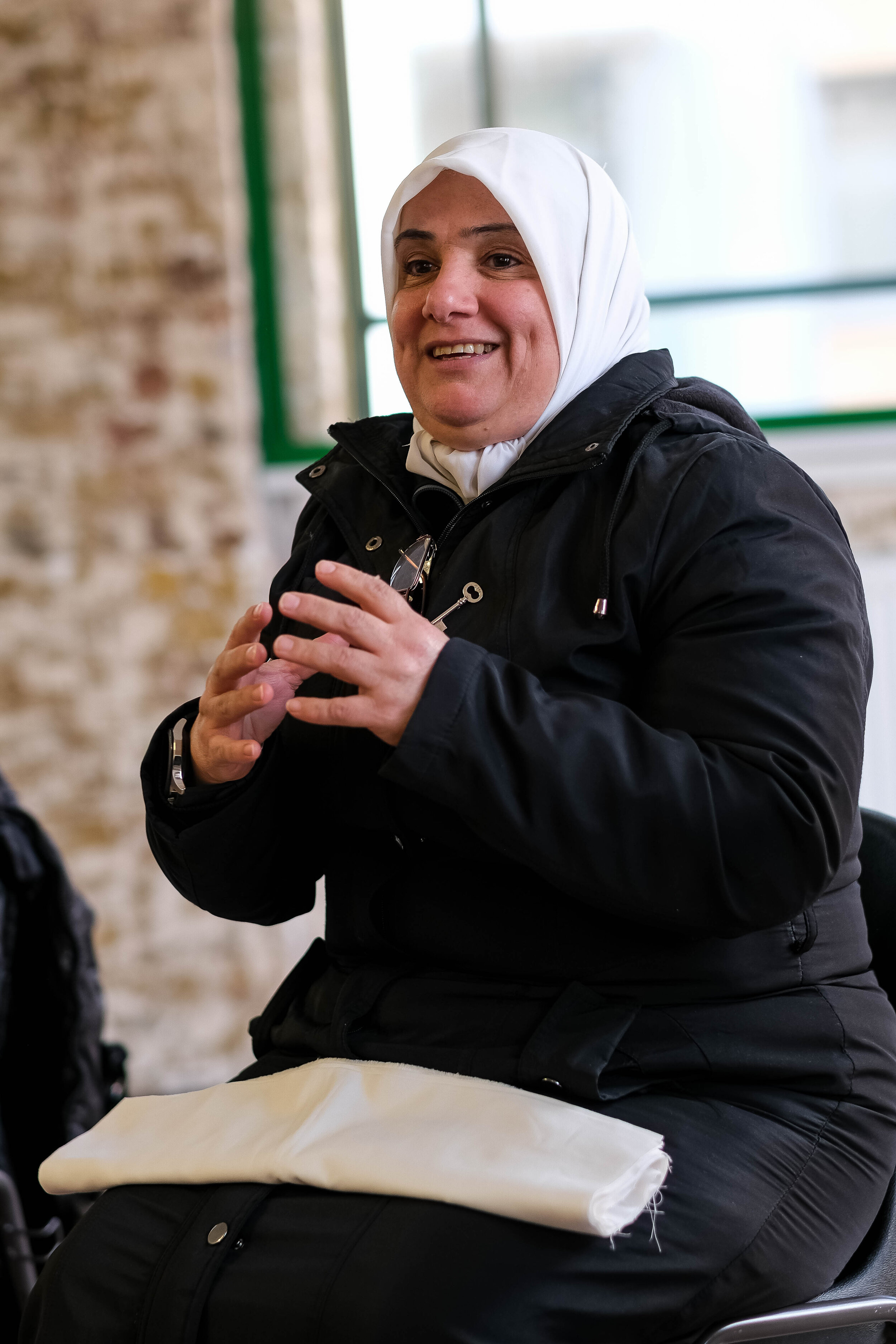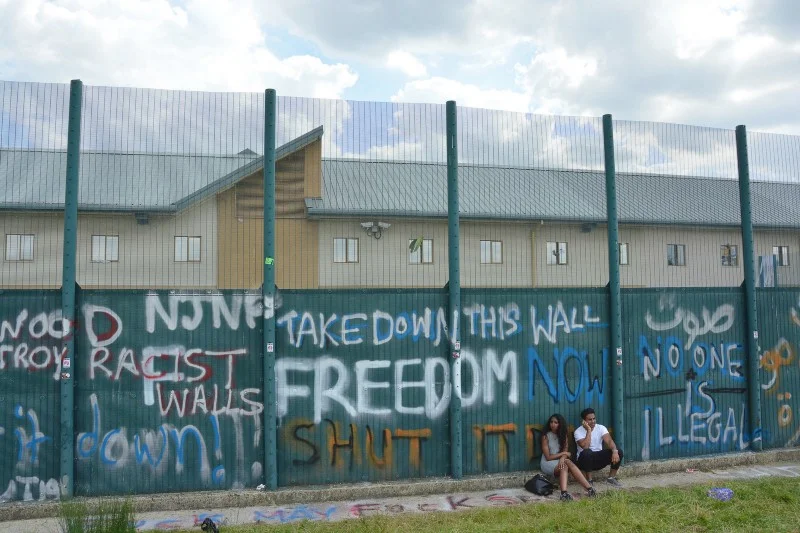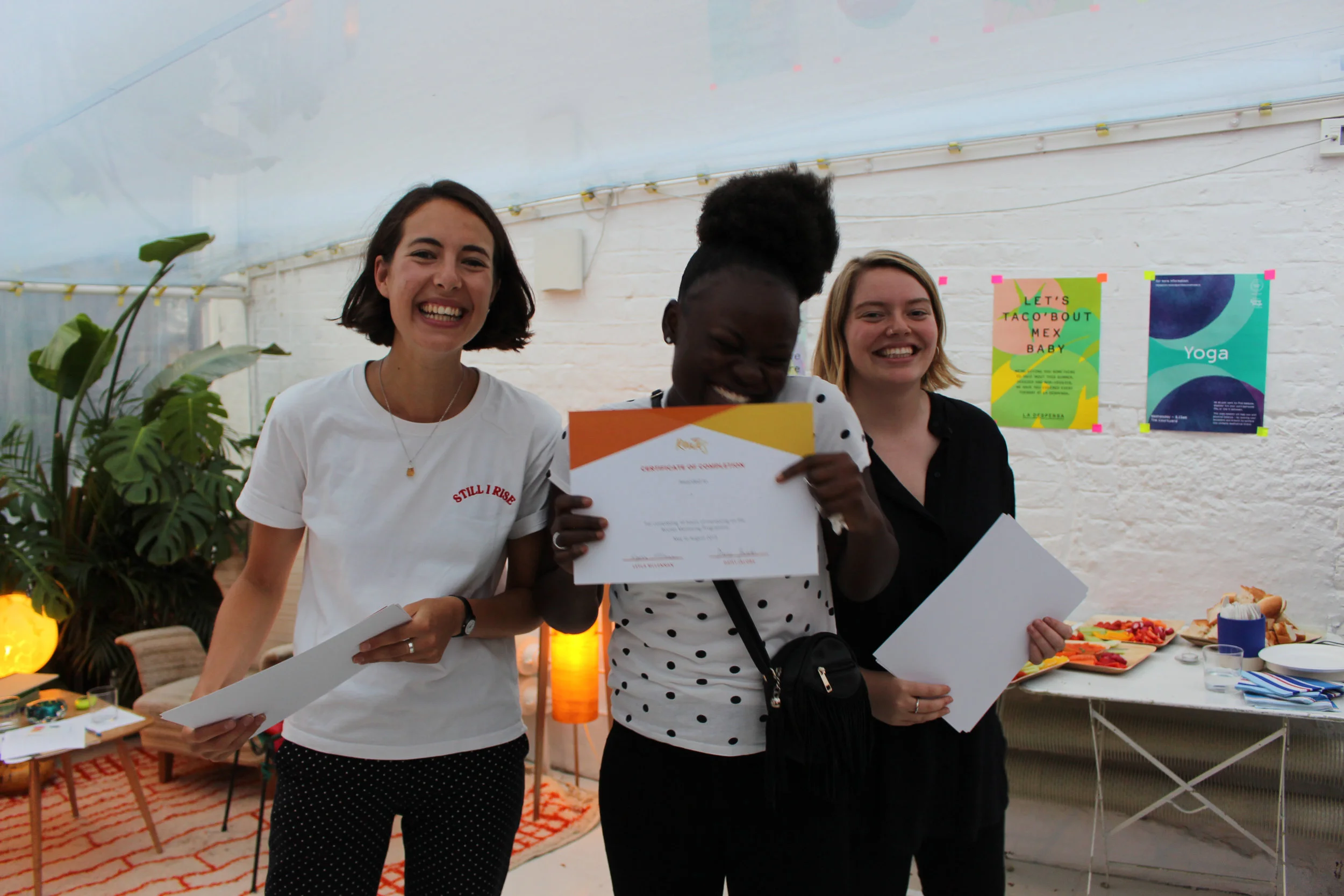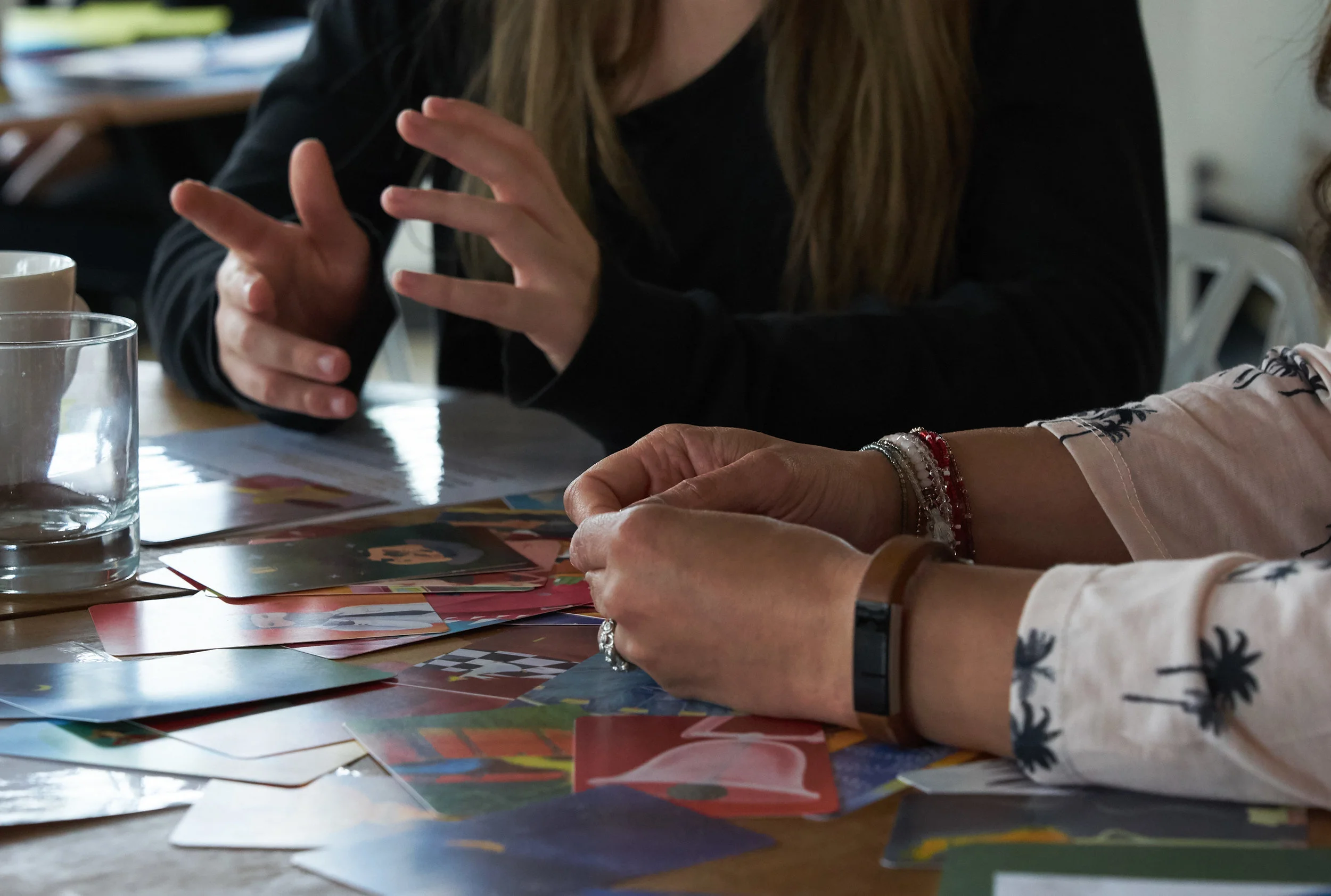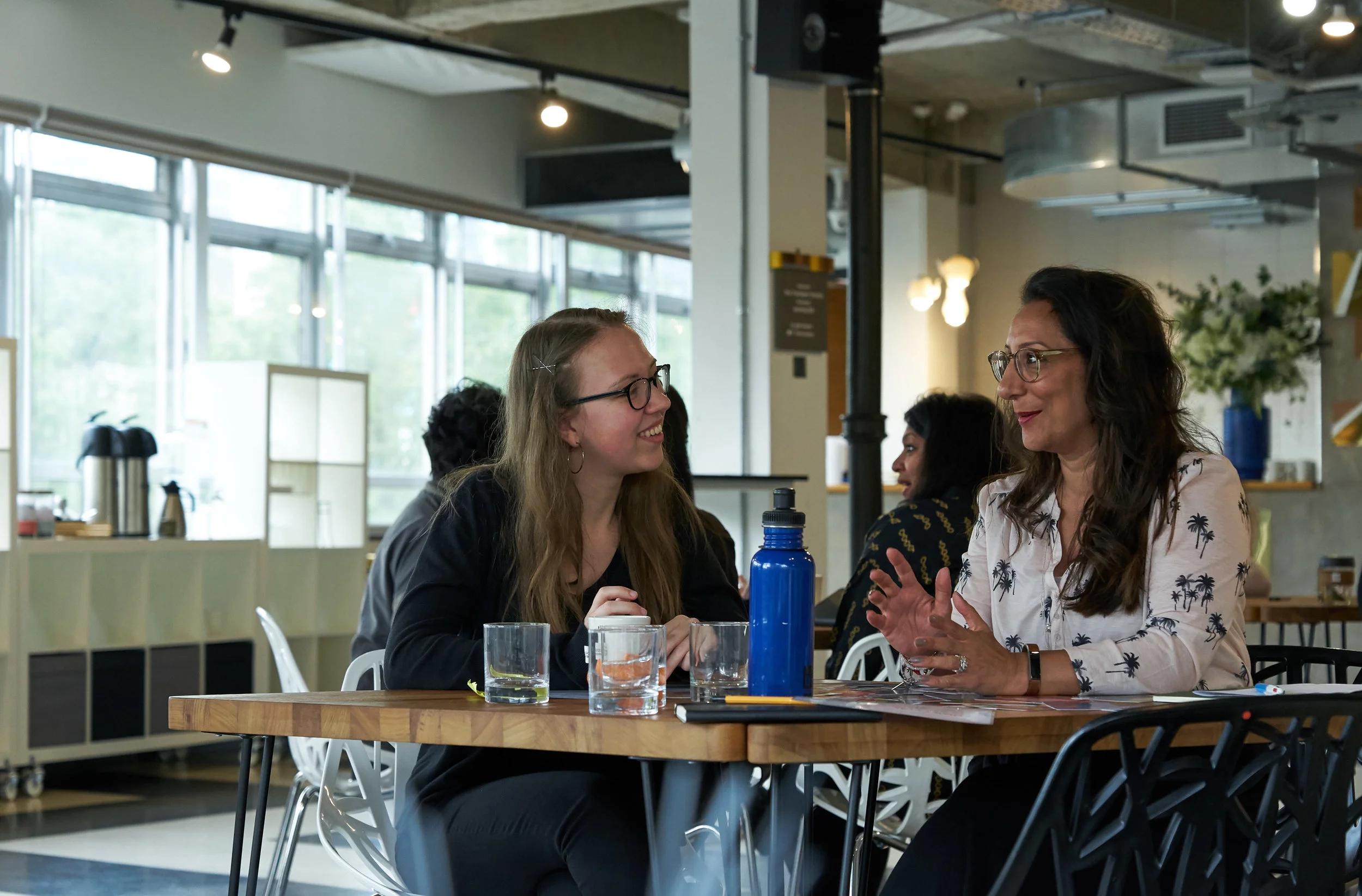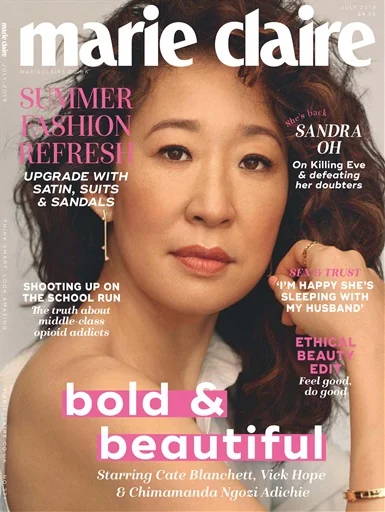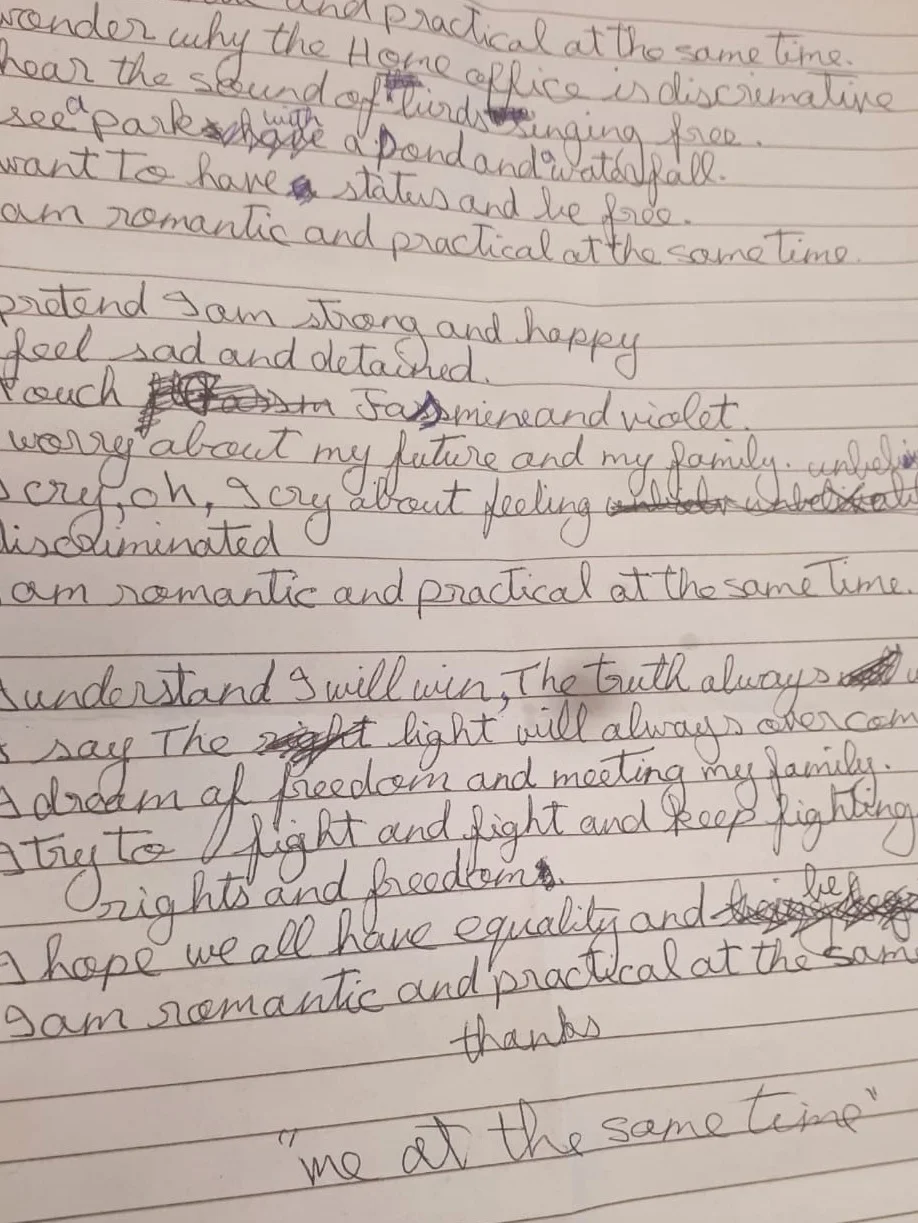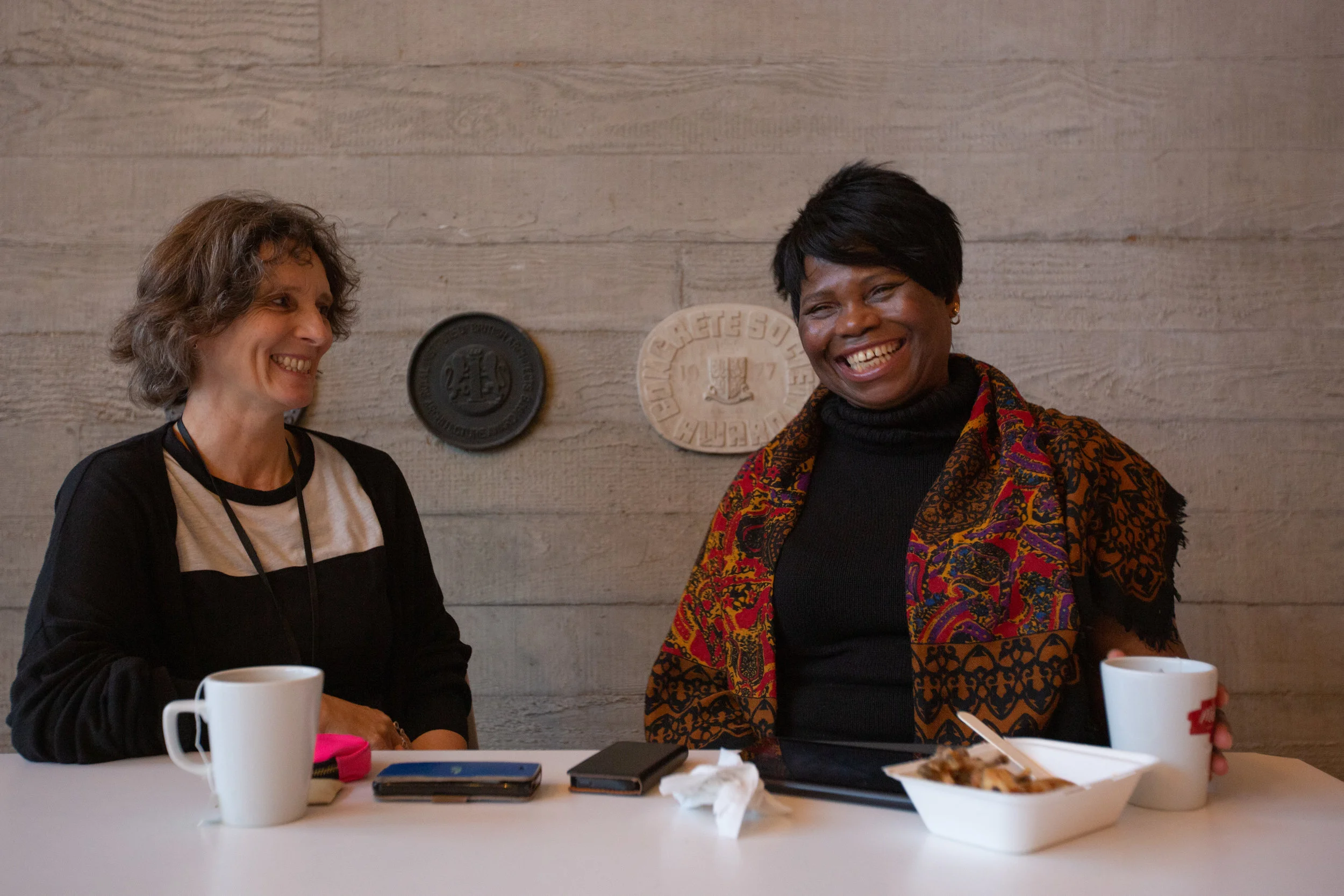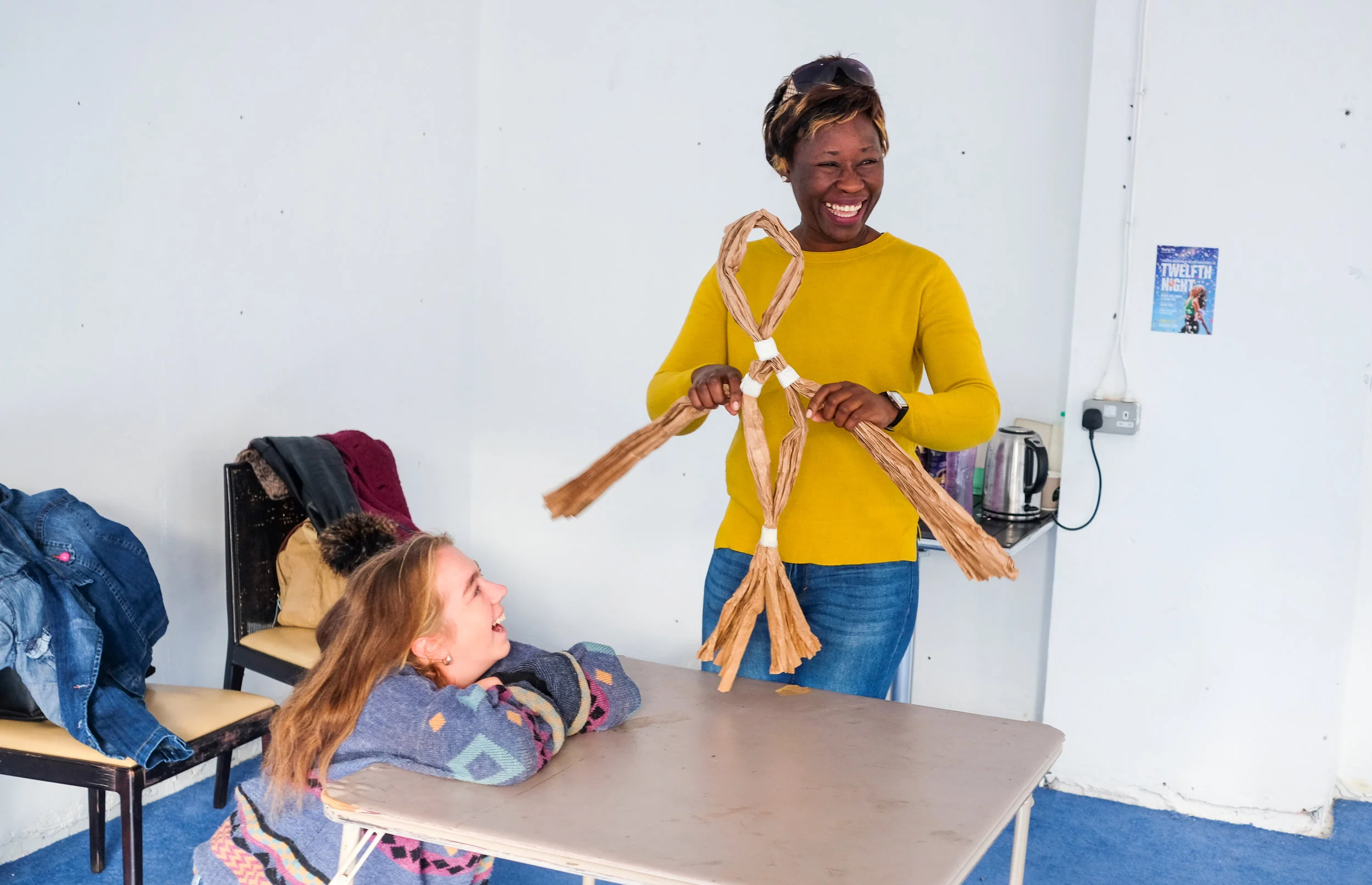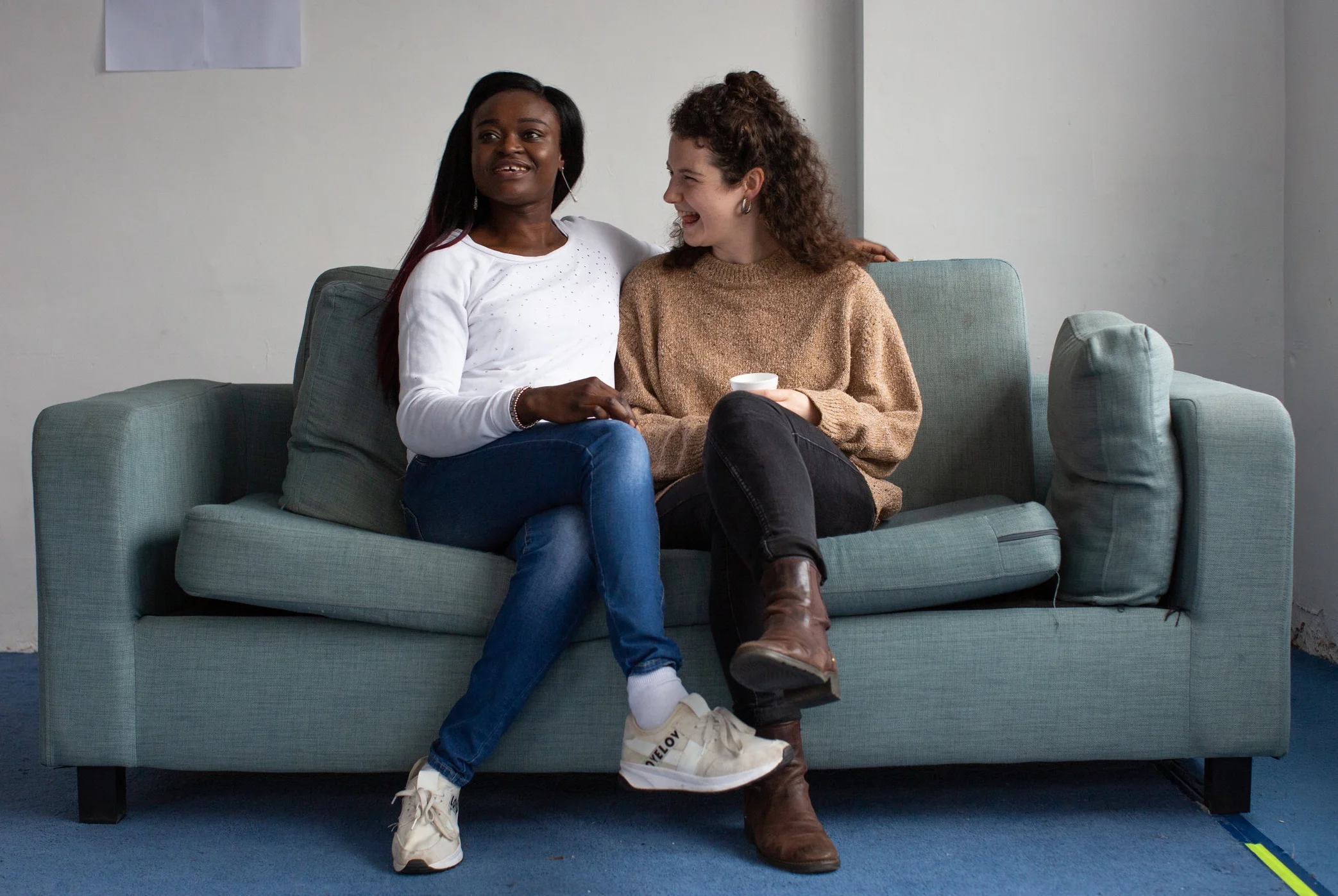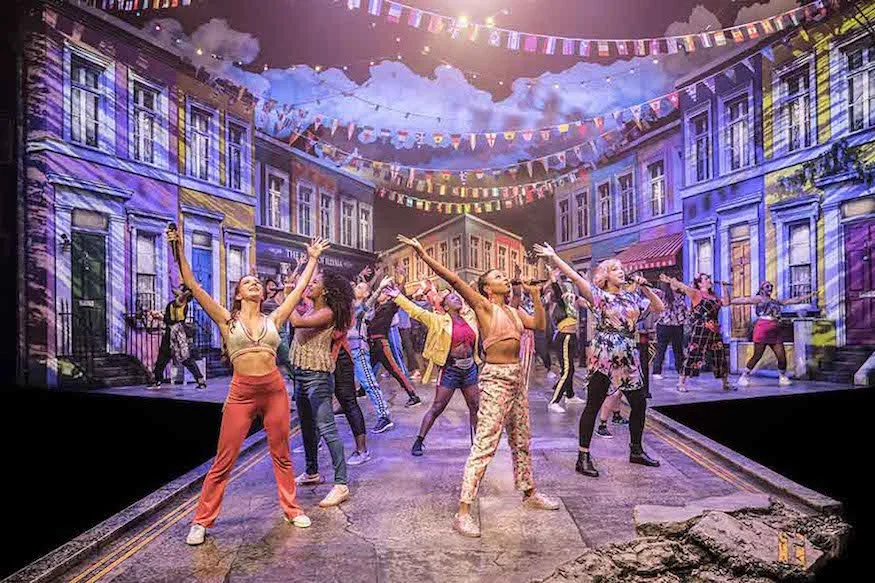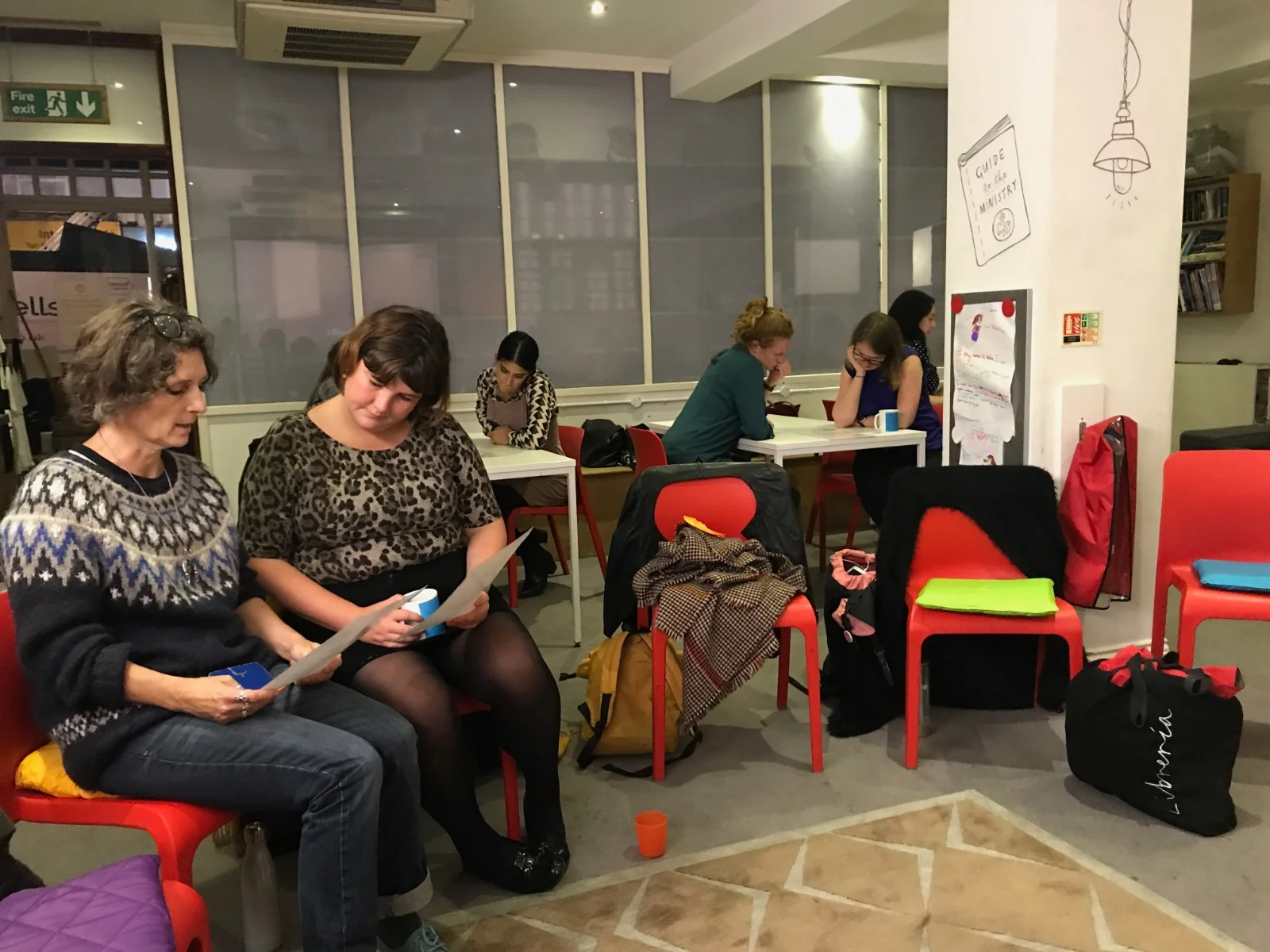Routes blog
The start of Amal's mentoring journey
It's like this programme is refreshing me. My mentor has put me on track, so at least now I know where I have to start from in order to restart my career again, after all that happened to me, which forced me to seek asylum in the UK.
Amal* is a mentee on our Summer 2020 programme. Here she shares some thoughts and reflections about her experience on the programme so far.
I signed up to Routes to refresh my experience and get knowledge of the work environment and working culture in the UK. To help me achieve my goal, which is returning to the media field or finding any volunteering opportunities in that field.
[Our first meeting] was great, we spoke about ourselves, getting to know each other, and from the first two minutes we got to understand each other quickly. My mentor is a lovely, open person and she made it easy for me.
In the first session we outlined goals to achieve, both in short term and some for long term. She gave me a brief about the media in the UK and how it works here and answered all my questions. Honestly she is making me feel so positive, letting me focus on my strengths and guiding me to achieve my goal.
She started by telling me about the media types in the UK, then about their strategy, so now I understand more about the work environment and freedom of journalism. She gave me the keys that helped me to find where I should start here, especially as I have nine years of experience in my country, which I did not know how to use here. Now I know where I am and what the gap is.
We discussed each newspaper and online media and the leaning of it: radical, liberal, fake news, modern, formal etc. That made me research more and write down questions and discuss with her in the next session. I reactivated my Twitter account, as I know that all journalists here use Twitter more than other platforms. In my country we use Facebook but in the UK, most people feel it's private, not for work.
She made me very active and I'm now starting to do some videos online for social media in Arabic and hopefully by the end of this mentor programme I'll be prepared and finished an article or video in English, which we are planning to send to any local news around me, getting engaged with them as a volunteer to start my journey.
To be honest, when I was referred to Routes and when you were contacting me, I never expected and imagined this huge effect on my personality - the way I'm thinking now and what I'm receiving from this programme. From the first three sessions I feel the difference. She gave information I will never find on Google or the internet. I'm so excited for the rest.
It's like this programme is refreshing me. My mentor has put me on track, so at least now I know where I have to start from in order to restart my career again, after all that happened to me, which forced me to seek asylum in the UK.
(*Amal is not her real name)
Mentoring Stories: Antonella Mandato
Current Routes mentor Antonella Mandato shares her experience of the programme so far.
This is the first blog post from our first digital mentoring programme! Antonella Mandato writes about her experience of the programme over the past four weeks.
Being a mentor with Routes has been a truly enriching experience from all points of view: the relationship with my mentee, as well as the other mentors; the training and support we receive from Routes; my personal growth.
Before starting, I was feeling a bit nervous about the challenge ahead. And I have to say that being a mentor is a commitment, but an amazing, fulfilling and enlightening one.
The first training was very well organised (on Zoom, considering the challenges with COVID-19). There was a lot of useful learning, for both the mentoring programme as well as for my personal life.
The highlights for me were:
Reflecting on the fact that every person has different experiences, backgrounds, baggage, personalities; and the empathy, respect and sensitivity needed when interacting with other people.
Different styles of communication from directive and authoritative to non-directive and empowering.
The qualities of a good mentor, including listening, being welcoming, non-judgemental, kind and positive, being joyful and patient, supportive and motivating, and giving ownership to improve confidence.
Interactive activities and exercises about personal values, personal strengths, exploring goals and objectives.
Information about the UK asylum system.
Introduction to Slack, a communication platform to connect with Routes and the other mentors on various subjects.
So far I have had four meetings with my mentee and they have been exciting, motivating, fulfilling and sometimes challenging, as we try to navigate resources available, understand the university system and scholarships opportunities. At the end of my second meeting, I was so excited that my husband hadn't seen me so buzzing in a long time.
The relationship that my mentee and I have built so far is enriching for both of us. She says she is very grateful and excited to be guided and supported, she has found the motivation and the belief that she can achieve her dreams and study at university.
For my part, I have tried to be a trustworthy non-judgemental mentor and empower her to make her choices, explore options, discover her strengths, as well as share resources, tips, useful websites, and ideas for a more structured work through recording progress on Excel spreadsheets.
Since our first meeting, my mentee has already identified good courses at university, as well as the necessary scholarships. She is in the process of applying, as well as networking with relevant stakeholders. What's more, during her meeting with other mentees, she shared the knowledge she has gained and provided them with tips and resources. This makes me very proud.
We have also established a friendly relationship and during every meeting we have informal chats about our week, our feelings and this makes everything very special.
For some people the first meeting might be a bit daunting but I was very lucky that my mentee is friendly and sweet and broke the ice by talking about COVID. I was very friendly too and we found out we have lots of passions in common, like cooking. Now we often speak about our lives, families and countries of origin. She teaches me words in her language and I teach something in Italian.
For me the most beautiful aspect of this programme is building a relationship with another human being and helping her on her journey to achieve one or more of her goals. I cannot even explain how fortunate I feel to have embarked on this journey and try to contribute, connect and make a little difference for another human soul.
Lockdown Activities
A selection of our favourite lockdown activities, from free audiobooks to online exercise classes, community choirs and much more.
Since lockdown began, many of us have been looking for ways to stay connected, creative and calm at home. We have compiled a list of some of our favourite online resources, from choirs to audiobooks, workouts to theatre shows and more…
Keep dreaming: audiobooks, stories and plays for all ages
Storyline Online: Storyline Online is a free online resource for remote learning during COVID-19. They stream videos featuring famous actors reading children’s books with creative illustrations.
Audible Stories: Instantly stream an incredible collection of stories, including stories in eight different languages, which will help keep children and adults alike dreaming, learning, and imagining.
National Theatre At Home: The National Theatre is streaming its past performances on YouTube for free every Thursday since the beginning of lockdown. You can watch the plays on their Youtube channel (each new play stays up for one week after its live stream).
Sing together: online choirs
Citizens of the World Choir: Due to the COVID-19 emergency the Citizens of the World are now a FULLY ONLINE CHOIR! They are providing weekly rehearsals via Zoom as well as maintaining their strong support network to combat feelings of isolation and difficulty during this unprecedented period. If you are a refugee who would like to join their online singing community please email rachel@cotwchoir.com or DM us on their Twitter or Facebook pages.
Fire Choir: During this period of self-isolation, Fire Choir is bringing people from around the globe together for a weekly virtual singing session. Everyone is welcome – no experience and no preparation is necessary. Sessions are taking place weekly on Monday evenings at 7pm (UK time) via Zoom. Find the link to join every Monday here.
Move your body: online workouts to do at home
Natasha Noel: Natasha Noel has a selection of great online yoga videos, but we particularly like her Morning Joint Movements video to energise your body (whilst staying in bed!)
Jessamyn Stanley: Stay active whilst really looking after yourself and your body. Jessamyn’s 8-minute Yoga for Self-Love video is the perfect way to energise your body quickly and with love!
Khadijah Safari: Khadijah teaches women-only kickboxing classes (now online) and whilst the classes are not free to join (it costs £25/month for unlimited classes), she does post great home workouts on her Instagram page, like this one!
Do you have any more to add? Comment below if so and we’ll add to the list!
Eszter: 'Each for Equal' Routes on International Women's Day
The theme of this year’s International Women’s Day is ‘Each for Equal’. We asked Eszter, a 2019/20 Routes mentor, to share her reflections, opinions, hopes and visions for a world where each of us takes responsibility for fighting for equality.
The theme of this year’s International Women’s Day is ‘Each for Equal’.
We asked Eszter, a 2019/20 Routes mentor, to share her reflections, opinions, hopes and visions for a world where each of us takes responsibility for fighting for equality.
* * *
Equality to me means a way of living together that allows us all to thrive; it means fair access to shared resources and opportunities; it means a chance for all to be recognised as valuable members of the community.
When I moved to the UK, I was shocked by the discrepancy between my experience, and how asylum seekers are treated. As a white woman with an EU passport and a PhD in economics, I was not asked to prove that I deserved to be here. I was welcome.
Asylum seekers do not enjoy this luxury: the unspoken, implicit assumption underlying the UK asylum system seems to be that people seeking refuge here represent a potential burden (or worse, a threat) to the country. Consequently, the system is designed to keep them out. From my experience as a Routes mentor, that assumption could not be further from the truth.
The women I have met through the Routes programme all amazed me with their strength, passion, hard work, resilience, kindness, curiosity and endless positivity despite their difficult situation. Many of them hold valuable qualifications, and those who have not had the chance to get formal training yet are eager to learn more and gain skills and experience. Those who are not allowed to work seek out opportunities to volunteer. They have so much to give, and we have so much to learn from them.
My mentee, Suzane, constantly amazed me with her intelligence, her unique points of view, her keen eye for detail, her appreciation for beauty and for her ability to find a silver lining in even the darkest situations. Changing our perceptions about asylum seekers and seeing them for the valuable members of our community that they are seems to me an important step toward removing the inequality in the system.
I am really inspired by the work of Seema Jayachandran, who is a professor of economics at Northwestern University. Her research brings questions around equality, fairness and inclusion to the forefront of economics. She studies the way traditional gender norms shape women’s access to employment and entrepreneurship opportunities, and tests ways to empower women through peer support and changing attitudes.
Suzane: 'Each for Equal' Routes on International Women's Day
We asked Suzanne, a 2019-20 Routes Mentee, to share her reflections, opinions, hopes and visions for a world where each of us takes responsibility for fighting for equality..
The theme of this year’s International Women’s Day is ‘Each for Equal’.
We asked Suzane, a 2019/20 Routes mentee, to share her reflections, opinions, hopes and visions for a world where each of us takes responsibility for fighting for equality.
* * *
To me, equality means we are all the same and we are supposed to be treated the same. I believe equality means that we should learn to respect each other and to take each other for who we are, not to put anyone down because of their situation or because of their circumstances, or where they come from or if they haven’t been to school.
Inequality to me is when someone doesn’t look at you as what you are. For example, men sometimes they treat women like they are children or very small; they find that you are not qualified enough to talk when they are talking, you just have to come and listen and obey. I find it a bit hard to take, but at the same time you just have to let go.
I also think that it is like when people look at you in a certain way because you haven’t got the qualification to stand next to them, or be on the same table as them or to be in their environment - you are not part of them. So many people go through this and face this, and I realise that so many women in particular go through this situation - they believe that they haven’t got much to bring, so they feel “my life is limited, I haven’t been to school, I’m not educated enough to raise my voice, I just have to obey this person and do everything he asks me to do because I’m useless. How can I raise my voice? I am nobody.”
So many women just accept this situation and live that life. For so many years, so many women have been in this situation. It is a good thing if we raise awareness about this so that those women can try to wake up, like from a dream, and know that they can leave.
I think the most important thing is to show the people around us that we care and that we love them, no matter what their situation is and no matter what they are going through. The first thing we have to do is to show them love, to make them feel special in their body and in their mind. When you go to the hospital, if the doctor doesn’t welcome you well, you start to think “Oh, I don’t know why the doctor didn’t receive me well? Is it because of my condition? Is it because I’m black?” You start asking yourself so many questions. But if you go to the hospital and the doctor receives you and welcomes you well, you feel like you want to tell them all your problems and how you feel in that moment.
We must show love to the people we come across to show them we care, so they can tell us about themselves and start opening up. I am just saying this out of my own experience. If someone shows me love, I feel more open and confident to speak to that person. We need to share the love to the people who surround us.
The person who has inspired me this year was the show we went to watch [with Routes], the Tina Turner Musical. I got so much inspiration from that show: you have to get up from wherever you are and try and stand up for yourself. No matter what is coming your way you have to be strong and not give up; you have to force and believe in yourself and people will start to appreciate you and respect you and love you.
I got so much inspiration from that show, and also from Eszter [my mentor]. Every time I met her she always treated me like I was like the same person like her, even though I always see myself as so little, so ‘down there’, she always made sure she put me on the top, where I felt like I was being loved and able to open up, because of the love she showed me, because of the way she treated me, because of the belief she put in me.
When you show love, the people around you feel free - that’s what she did for me. She helped me to have the confidence to build up myself and be able to speak out, and she always made sure I was being treated well, which made me feel really good. That made me feel like I was a member of society, like a grown up person. Every time we met, she always made sure I felt good in my body. Nobody had done that for me. I believe that if we all show love to one another as she did with me, the world will be a good place and so many women will not be scared to open up and speak their mind because they will be loved.
2019 with Routes
December is always a nostalgic time of year for Routes...
In 2017 we were launching Routes at Year Here’s Crowdbacker event and, a year later, in December 2018 we were celebrating the end of our first mentoring and theatre programmes at the Young Vic, accompanied by the delicious smells of fresh cooking and the occasional burst of song. Now, in December 2019 we are celebrating another extraordinary year at Routes: our community has grown and we’ve nurtured even more joyful, welcoming and compassionate connections across London. Here’s what we’ve been up to...
December is always a nostalgic time of year for Routes...
In 2017 we were launching Routes at Year Here’s Crowdbacker event and, a year later, in December 2018 we were celebrating the end of our first mentoring and theatre programmes at the Young Vic, accompanied by the delicious smells of fresh cooking and the occasional burst of song. Now, in December 2019 we are celebrating another extraordinary year at Routes: our community has grown and we’ve nurtured even more joyful, welcoming and compassionate connections across London. Here’s what we’ve been up to...
In February 2019…
we started running our drop in workshops at the Young Vic’s Platform Southwark, welcoming up to 25 women each week to play, create, laugh and learn together. Supported by amazing volunteers and nourished by the Bread Station, we built a creative community that grew week on week.
In March and April 2019...
we were invited by the very generous National Theatre and Nimax Theatres to see the awe-inspiring Small Island (NT) and Emilia (Nimax). Both shows were beautifully moving and we had truly amazing evenings at both!
“I liked the broad appeal of the play, written by women for women at a time when they had little voice. So impressed by the character of Emilia on stage at all times during the performance, it well deserved the standing ovation when the play finished.” (Karlene)
In May 2019...
we launched our second mentoring programme, pairing 22 professional women with 22 women from refugee backgrounds for four months of mentoring. Together, the pairs worked towards their mentees’ goals, ranging from CV writing and attending interviews, to general confidence building, digital skills, language development and much more. Read Luba’s account of her mentoring journey.
In June 2019...
we were generously enabled by donations from the wider community of Routes supporters to launch a series of Refugee Week activities, bringing together women seeking safety across London to join us in a movement workshop, a self defence workshop and a theatre trip to see Phosphoros Theatre’s brilliant Pizza Shop Heroes.
In August 2019...
it was time to celebrate the end of our second cohort’s mentoring journeys. We came together at Second Home Holland Park to reflect, look forwards and catch up over drinks and snacks with all mentors and mentees. It was very special to hear how many new compassionate and caring relationships had been built since we all first met in summer. Read Sophie’s account of her mentoring journey.
“We all get absorbed in our day to day lives… through programs like Routes you are able to step outside of your comfort zone and take on the challenge of making a difference.” (Nahida Rahman, mentor)
In September 2019...
we started a 10 week programme at the Arcola Theatre, facilitated by the brilliantly passionate Lateisha Davine Lovelace Hanson alongside the wonderful writer Eva Edo, supported by Alessandra Davison. The programme brought together 16 women from refugee backgrounds to explore, create, share, listen, move, dream, sing and laugh together every Monday morning, working towards a beautiful sharing performance in December. See more photos on our Instagram.
In October 2019...
we challenged theatres across London and beyond to reflect on how theatres can be spaces of welcome for people seeking safety in the UK. In a conference held at the National Theatre, we brought together theatres, NGOs, practitioners, grassroots organisations and individuals with lived experience of the asylum system to discuss how more theatres can and should engage in the work of creating welcome. We heard from the British Red Cross, Phosphoros Theatre, Compass Collective, Young Vic, Leeds Playhouse, Counterpoints Arts, Good Chance, as well as some of the Routes community. The room was left buzzing and we’ve loved watching how different organisations have actioned their learnings from the day. Read more about the event on Twitter.
Also in October 2019…
we launched our third mentoring programme! We’ve brought together 16 pairs this time around, training and supporting 16 professional women to support 16 brilliant mentees to achieve their personal and professional goals. We’ve partnered with two amazing organisations on this programme, Happy Baby Community and Migrant Help. The progress already being made by mentoring pairs is astounding and we can’t wait to celebrate their journeys with them in February next year!
In November 2019...
we were invited by the wonderful Phyllida Lloyd to watch Tina: the Musical at London’s Aldwych Theatre. We sang our hearts out, we laughed and we cried and... we were lucky enough to share a drink with Phyllida and cast member Ed after the show, which very quickly turned into a group sing-along! We discussed why access to theatre and the Arts is so important for people who are seeking safety in the UK, especially those seeking asylum who do not have the right to work, receiving only £5.39 a day from the government, which barely even covers travel costs in London.
And finally, in December 2019...
we celebrated the end of the year with ‘I Am Alive - the Power of Women’ at the Arcola Theatre, after 10 weeks together. 70 audience members gathered to watch the phenomenal cast of women share their stories, poems, songs, paintings and more. Watch this space for photos coming soon!
If you’ve made it this far, thank you for reading! And if you are one of the many people who has joined us, supported us, followed us on social media, donated to us or simply taken interest in the work we do… an extra big thank you to you.
This month, we learnt that we are set to face at least another five years of hostility, austerity, injustice and discrimination in the UK. It is in these times that we need communities of hope, joy, patience and compassion more than ever. We need people - alone and together - to step up in the place of a government that persistently overlooks and mistreats people of colour, refugees and asylum seekers, women, children, people on low income, parents and carers, and other minority communities across the UK. In 2020, we are calling on you to connect with the neighbours in your communities, to reach out and spend time with people who have different life experiences to you, and (if you are able to) to support the small organisations plugging the massive holes in whatever ways you can.
Let’s come together to ensure that the next five years (and beyond) are defined by community, solidarity and compassion.
Happy New Year from Routes
'End detention now' - A poem about immigration detention by E.E.
A poem written by E.E., a participant in our theatre workshops, about immigration detention.
Detention is. Detention is.
Do you know the prison?
Do you ever locked up in a cell?
There is no different between being criminal or innocent.
Detention is. Detention is.
Being vulnerable is a big crime.
Trying to follow law. The law escape from you.
Try to find solicitor. Solicitors are not free.
Detention is. Detention is.
Freedom is so far.
Deportation is so near.
Fear. Cry. Suicidal thought.
What have I done?
Why am I here?
Detention is. Detention is.
Expired sanitary product.
Forced untasty food.
Dark, hopeless, end of the tunnel.
Work for one pound per hour.
Detention is. Detention is.
There are no human rights.
It is abuse and humiliating.
End the abuse of human right.
End the disaster called detention.
End detention. End detention.
— ‘End detention now’ by E.E.
About immigration detention in the UK
Immigration detention is the practice of holding people who are subject to immigration control in custody, while they wait for permission to enter or before they are deported or removed from the country. It is an administrative process, not a criminal procedure. This means that migrants and undocumented people are detained at the decision of an immigration official, not a court or a judge.
Home Office policy says that detention must be used sparingly and for the shortest possible period. But in reality, many thousands are held each year, and some for very lengthy periods, causing serious mental distress. Unlike most other European countries, there is no time limit on immigration detention in the UK.
The UK is one of the largest users of detention in Europe. People are detained in detention centres known as 'Immigration Removal Centres' (IRCs), Short-Term Holding Facilities (STHFs) and prisons.
Around 24,000 people are held under Immigration Act powers every year, for a range of reasons. Some are asylums seekers who have had their claim refused. Others are asylum seekers who have a claim in process, and are being held while that decision is made (under what is known as the Detained Fast Track). Whatever the circumstances, being held in prison-like conditions without a time limit causes anxiety and distress. Many detainees already have traumatic backgrounds, and the psychological impact of being held is absolutely damaging.
Sophie's mentoring experience
My mentee and I hit it off instantly. Sara greeted me with the most amazing smile and we went straight in for a hug. Our first session went really well and it was surprising how at ease she felt – this also helped me to relax…
Sophie is a Projects Coordinator at online mentoring organisation Brightside
I signed up to be a Routes mentor because I was looking for an opportunity to make an impact and to enhance my leadership skills. I have experience of campaigning for refugee and asylum seeker rights from university and have a keen interest in the power of women supporting women so naturally Routes was the perfect fit for me!
I would recommend being a Routes mentor to a friend or anyone seeking an opportunity to develop their mentoring skills. I work for a small organisation therefore this opportunity has provided me with a chance to develop practical skills for future line management outside of the formal work structure developing my listening, communication and time management skills and patience.
My mentee and I hit it off instantly. Sara (not her real name) greeted me with the most amazing smile and we went straight in for a hug. Our first session went really well and it was surprising how at ease she felt – this also helped me to relax! Sara and I are very open and honest with each other which I think is key to building a mentoring relationship, if she is ever having a tough day she will just let me know. Equally if she is in the mood to power on with a full English lesson she will say so. I’ve both enjoyed and found it challenging to vary our weekly sessions to get the best out of our time together.
Sara’s goal is to work as a nurse again. This will be a long journey requiring her to gain the right to work and restudying for her qualifications.* Despite this rather uphill struggle she is good at breaking down her goal into smaller steps. When we first met she told me that she wanted to work on her spoken English so this is where our focus has been for the past 10 weeks.
I remember during our first session that we banned the phrase ‘I can’t speak English’ as Sara can speak English. We have focused on strengthening her confidence in her spoken English ability. Some weeks we just talk and discuss funny English phrases like ‘bits and bobs’ or work through English exercises online or complete Sara’s English lesson sheets. I’m amazed how far Sara has come in a few short weeks – I can now barely get a word in during our hour long sessions!
She accepted my challenge of ordering our coffees in week 8 with ease – a task that would have terrified her in week 1 and is hoping to start ESOL English classes in September to work towards her qualifications. ESOL classes are accredited courses that provide recognised qualifications that are crucial for getting jobs or moving onto other courses. It is great to know that Sara is supported by her English teachers and is ready to start her next step in her English lessons after our time together on the programme comes to an end.
A massive highlight was when Sara told me how a stranger on a bus had complemented her English ability at random. Hearing praise from a stranger really helped Sara to see how her English is improving and to believe that the positive feedback she receives from both me and her English teachers is true.
It has been really enjoyable to use my experience of mentoring from my workplace and previous mentoring roles in a new way. I’ve always worked with young people so it’s been great to gain experience of mentoring someone older than me and not in formal education. My experience as a Routes mentor has demonstrated how mentoring can support asylum seekers in Britain and how working with someone to achieve what may appear a small aim to outsiders is actually the start of a mentee’s journey to a bigger goal.
Applications for our autumn 2019 programme close on Friday 6th September. Apply now!
*Asylum seekers in the UK do not currently have the right to work. Find out more about why and the effects of this here.
Lessons learnt: Luba's mentoring journey
Sitting in Clapham Junction’s Cafe Nero on a spring Friday morning, I felt a little excited and slightly nervous in anticipation of meeting Betty for the first time. As a first-generation immigrant myself, who had received support from so many on my integration journey, I had always wanted to work with refugees to give something back.
Luba’s journey
Luba Kassova is Director and Co-Founder of AKAS consultancy and a mentor on our Summer 2019 programme.
In this blog post, she reflects on her mentoring experience with her mentee, Betty, and the lessons she learnt along the way.
Sitting in Clapham Junction’s Cafe Nero on a spring Friday morning, I felt a little excited and slightly nervous in anticipation of meeting Betty for the first time. As a first-generation immigrant myself, who had received support from so many on my integration journey, I had always wanted to work with refugees to give something back. So this meeting was a dream coming true. My nervousness stemmed from the uncertainties I was facing: would Betty and I get along? And, more importantly, could I make a positive difference to her life in 10 sessions?
It transpired that my instructions about where to meet had been somewhat ambiguous, leading Betty to struggle to find the cafe. Betty, for her part, had not allowed enough time for her journey and was running late. Consequently, our first meeting started 45 minutes late. Despite the rather stressful, sub-optimal start, we connected straight away. Within minutes of meeting, I was engrossed in Betty’s story and humbled by what she had gone through in the last 20 years. (Lesson #1: Don’t worry if the first session doesn’t go quite as you had imagined). As the sessions progressed, I became deeply touched by Betty’s warmth and her passion for bringing people together through her cooking.
Despite our very different backgrounds, circumstances and cultures, I found that Betty and I had a lot in common. We had both been in London for almost two decades; we both loved bringing people together; we both enjoyed food; and we had both lost our mums early in life. I was able to relate to Betty in a way I had not expected to so soon (Lesson #2: Similarities will be there if you look for them.)
Betty’s drive to launch her own business was invigorating. It chimed with my own drive over the last 7 years for running my business. Betty and I started planning events which would showcase her cooking and provide her with feedback on her menu and intended pricing. Throughout our work together I often remembered an invaluable piece of advice we received from the Routes team - celebrate the small victories, not just the big ones (Lesson #3: Take Routes’ advice!). This advice helped me to notice and celebrate all the milestone moments Betty and I reached together, however ‘small’. For example: our shared emotion when writing the invitation for an event; Betty completing her tasting menu; me locating a laptop for her to enable her greater independence; Betty providing the last prices for some ingredients to finalise the budget; the two of us simply sharing a moment of empathy.
At the start of my mentoring journey my sole focus was on how to help Betty, searching constantly for different ways I could enhance her life in the limited time we had together each week. What I hadn’t anticipated, but realise now, is how much Betty enhanced my life. Her honesty, the unique challenges she continues to face, and her natural wisdom opened new perspectives on the world for me. In different ways, we each ended up as both mentor and mentee. I left every session feeling enriched and grateful for my interactions with Betty (Lesson #4: Reflect on how the mentoring engagement is affecting you).
During one of our later sessions - while discussing people’s diverse beliefs – Betty, in her unassuming and perceptive manner, said something which will stay with me forever:
“We are all going to the same place in the end, but some of us want to get there on foot, others by bus, or by car, or by taxi or by bike. And that’s ok. Everyone is free to get there however they do. What really matters is that we are going to the same place”.
So here I am, on a hot summer’s afternoon, reflecting on how liberating it feels to worry less about each step that Betty and I take on our mentorship journey and how reassuring it feels to trust that our shared humanity will keep taking us where we need to go (Lesson #5: Trust!).
Luba Kassova | Director and Co-Founder - AKAS consultancy
Read more mentoring stories…
An interview with mentor Laura Collier-Keywood
Laura speaks to us about why she became a mentor and how she’s found the experience…
Routes chats to Laura Collier-Keywood, Head of Financial Planning and Analysis at Citizens Advice and a mentor on our Summer 2019 mentoring programme.
“She has such a positive view on the world. Even though she has been through some very difficult times she still remained positive and optimistic. Applying for jobs and going to interviews can be such a draining experience, and whilst she received a number of knock backs she would always remain really positive and viewed it as a learning experience. I'm so glad to be able to say that her persistence paid off and she was recently offered a role which suited her perfectly.”
Routes: Hi Laura! To start, could you tell us why you signed up to be a mentor?
Laura: I felt like I had skills and experience which I could share and help other women in achieving their goals. At the same time I was keen to develop my mentoring and leadership skills. I was also interested in the asylum system as it is something you hear a lot about, but I was keen to learn more and understand it from a more personal perspective.
Routes: How did you feel before you met your mentee?
Laura: I was quite nervous and apprehensive but excited to meet her… She was really easy to talk to and very open which really put me at ease. Our first meeting was really a chance for us to get to know each other a bit better and start setting some goals and expectations.
Routes: What is your mentee’s goal?
Laura: Her goal is to get a job, specifically within the finance sector as she has the relevant training and qualifications and has worked in this sector previously, but has been out of work for a while.
Routes: What do you most admire about your mentee?
Laura: She has such a positive view on the world. Even though she has been through some very difficult times she still remained positive and optimistic. Applying for jobs and going to interviews can be such a draining experience, and whilst she received a number of knock backs she would always remain really positive and viewed it as a learning experience. I'm so glad to be able to say that her persistence paid off and she was recently offered a role which suited her perfectly.
Routes: Would you recommend becoming a Routes mentor?
Laura: I can't recommend this programme highly enough! It's amazing to be able to be part of someone else's journey in achieving their goals whilst still learning invaluable skills yourself. I have really enjoyed it and found it invaluable.
Routes: Why do you think your employer sponsored you to become a Routes mentor?
Laura: Due to the leadership training and mentoring skills. I think leadership skills are really important and often training gets neglected. Mentoring enables you to work on a lot of different skills including listening, communication, feedback and interpersonal skills. With this course you get to put the skills into practice straight away as well as getting a real sense of purpose and fulfilment of doing something that really has an impact on other people's lives.
Nahida and Daniela's mentoring stories
Ahead of opening applications for our Autumn/Winter mentoring programme, we asked some mentors and mentees on our current programme to share their experiences so far.
The first in a series of ‘Routes mentoring stories’, in which mentors and mentees share their experiences.
Nahida (Comms Planning Director for M/Six) - mentoring Oyinlola
“We all get absorbed in our day to day lives… through programs like Routes you are able to step outside of your comfort zone and take on the challenge of making a difference.”
I had expressed frustrations to our Head of People [about] wanting to do more outside of work to make a difference to the lives of women. Having had such amazing opportunities and support in my life I wanted to be able to give something back in return… It’s hard for someone to start afresh, let alone not knowing how to start. In devoting some of my personal time and energy I thought it could make a small difference building up an individual's confidence and skills.
We all get absorbed in our day to day lives and whilst there are opportunities to make a difference in your own industry, through programs like Routes you are able to step outside of your comfort zone and take on the challenge of making a difference to the life of someone who lives in a completely different world to yours. Businesses need to give back to the wider society and not just help within their own industry.
[Before our first meeting I was] nervous, excited and apprehensive about whether I would be liked, whether I could really make a difference… We were both nervous, and I think our first meeting was about feeling comfortable to open up and just talk. I was blown away by the confidence of this young women who had faced so many obstacles.
Since then she landed two interviews, was offered both jobs and to top it all off we are both working to get her onto a Digital Marketing Course for her future career.
[I admire] her positivity and warmth. And how humble she is and doesn't realise how much she has achieved. Though she has been faced with so many obstacles, she keeps growing.
I have already recommended this programme to a client of mine. It’s an experience where you are given the chance to make a difference to another woman, and you get rewarded seeing that difference come to life. A few hours of your time can make the world of difference to someone else.
Daniela - mentored by Rachel (Development and Community Manager, Goldsmiths SU)
“Asylum seekers and refugees most of the time don't have information about things we would like to do, [like] studying or working in this country… Because of programmes like this, so many women are advancing a lot on all kinds of things.”
I had heard about the programme from my housemate last year who had a mentor herself. I have always been very sceptical about mentors but I decided to give it a go. I wasn't sure how a mentor could help me to find out things which were personal as well, for example understanding what I’m good at and what kind of jobs I could do.
[Our first meeting was] so natural. We shared things about ourselves and what we were hoping to get from each other. I thought she is so cool and friendly and can definitely help me. She has been amazing finding out all the information I needed, and now we are working on the last details about admissions to university.
Asylum seekers and refugees most of the time don't have information about things we would like to do, like studying or working in this country… I wouldn't get the same information myself about university, how I can apply for funding or voluntary work opportunities, jobs I can do after I study etc. It's very important that mentors keep that amazing work going to make us feel we belong and we are part of this society so we can give our contribution to this country. Because of programmes like this, so many women are advancing a lot on all kinds of things.
(N.B. Both mentees’ names have been changed for privacy reasons)
Routes featured in Marie Claire
Routes featured in the July issue ‘Women Who Win’
July 2019 #WomenWhoWin series
Poetry from Routes
Two poems written by women (E.E. and Esther) in one of our weekly theatre workshops, hosted by the Young Vic.
On Friday 17th May at one of our weekly theatre workshops, we all wrote and performed poems about ourselves. Ahead of a summer break in our workshop series, we share two of these poems…
‘Me at the same time’ by E.E.
I am romantic and practical at the same time
I wonder why the Home Office is discriminative
I hear the sound of birds singing free
I see a park with a pond and a waterfall
I want to have status and be free
I am romantic and practical at the same time
I pretend I am strong and happy
I feel sad and detained
I touch jasmine and violet
I worry about my future and my family
I cry, oh, I cry about feeling discriminated
I am romantic and practical at the same time
I understand I will win, the truth always wins
I say the light will always overcome the dark
I dream of freedom and meeting my family
I try to fight and fight and keep fighting for my rights and freedom
I hope we all have equality and be free
I am romantic and practical at the same time
‘I am funny and hospitable’ by Esther
I am funny and hospitable
I wonder why there is inequality
I hear my son giggle
I see my husband smile
I want to travel the world
I pretend to be strong within
I feel like skiing
I touch my love’s chest
And I worry about the future
I cry when I am not believed
I am funny and hospitable
I understand life isn’t fair
I thank god we always make a way
I dream I live in a mansion
I try making people happy in my own way
I hope for a better tomorrow
I am funny and hospitable
What is purposeful leadership?
We believe great leadership starts with joy, welcome and patience. Hear more about why we think this and how it affects the way we lead.
Routes grows compassionate leaders, supporting everyone we work with to lead with purpose, according to our three key values: joy, welcome and patience.
Joy
We believe that great leaders bring joy to everything they do. They make experiences delightful; they default to optimism and positivity; they bring a smile to their work and uplift those around them. One of our faculty members, Cat, once described mentoring as leading by, ‘flying another person like a kite, not walking them on a lead.’ We believe our mentors help their mentees to fly through joy.
Welcome
We don’t stick to many rules at Routes, however there is one rule we do keep: welcome every new person who enters the room. We believe that a sense of genuine welcome is the foundation on which we are all able to flourish. Feeling welcomed, held and supported enables us to take risks, make mistakes and open up our minds to new and exciting possibilities. From sitting in circles where everyone can be seen, to learning people’s names; from thanking people for their contributions, to catching people up on what they’ve missed – we know that leaders who lead with small acts of welcome make all the difference.
Patience
Each one of us has a different lived experience, different core values and beliefs, different memories and associations, different skill sets and habits, different likes and dislikes. Our understandings and measures of ‘success’ therefore differ too. We believe that compassionate leadership has a respect of this at its core. We support our mentors to lead with patience, driven by an awareness (and a celebration) of the nuances and complexities of what it means to be human.
If you would like to develop your compassionate leadership skills, why not apply to become a Routes mentor or get in touch to discuss how we could train your future leaders.
When business and purpose align: existing at the intersection of profit and purpose
How the corporate and non-profit sector can work together for a bigger impact
“If you want to develop a good relationship with a corporate, sometimes you just have to create an opportunity that works for them, even if it doesn’t really do much for you.”
“I know a charity that has a single wall that different corporate groups regularly come to paint over.”
I’m at a breakfast conference about Corporate Social Responsibility (CSR) and how businesses can work with charities to make social impact, whilst simultaneously making their employees feel more fulfilled and ‘purposeful’. I’m not hearing the above statements for the first time, so I’m not surprised by them. But I am still disappointed. In the conversation between nonprofits and corporates, there always seems to be a clear and unchallenged power dynamic, wherein the corporate has the goods and the nonprofit must, like an award-winning contortionist, bend itself to fit the corporate’s needs and wants.
And to some extent it’s true - there are things that big corporate companies have that smaller charities, social enterprises and community groups do not - namely money and people-power. But I believe the same is true in reverse - that charities, social enterprises and community groups have huge amounts that large corporate organisations do not, and that they should be confident in that too.
This is, of course, not a new or radical thought. I have heard great examples of large companies partnering with nonprofits on national campaigns; from Network Rail and Samaritans working to reduce suicides on train tracks, to Autistica and Deutsche Bank collaborating to get more young people with autism into banking. Both of these are examples of corporates relying on the knowledge and insight of charities to deliver work with great social impact and real business benefits to the corportates: fewer suicides leads to fewer train disruptions and happier drivers, whilst supporting some of the 77% unemployed autistic adults into work enables them to contribute their unique skill sets to currently non-neurodiverse workplaces. But these collaborations take huge amounts of time, money and resources and often take on a life of their own outside of the core work of the charity or business.
Most corporates today will talk openly about their commitment to CSR, acknowledging that good volunteering, fundraising and community engagement opportunities help them to attract and retain their workforce by making them feel more fulfilled and ‘purposeful’, as well as giving their employees wider and more diverse insights and experiences, particularly if they are interacting with a range of customers or clients in the work that they do.
So why are nonprofit organisations still being asked if large groups can come along for a day to paint walls, pick up litter or ‘join in’? Why does criticality so often go out of the window when we are thinking about employee volunteering or CSR?
I am convinced that the truly fulfilling, mutually beneficial, impactful, insightful and rewarding stuff takes time and is simply not as effective when done at large scale. A commitment to ‘doing good CSR’ is, in my opinion, a commitment to meeting the charities, social enterprises or community groups that you want to support half way and being open to the idea that you won’t be able to involve your entire company at once (or you will be able to, but that it will basically be an away day with the possibility of some small scale social impact at the end - take a litter picking day, for example, or the painting/tidying of a communal area of a community centre). Not only is deeper, more thoughtful engagement significantly more beneficial to the charities and the individuals/communities they are fighting for and with, but the effect on the business will be infinitely greater too, because we can all tell when the work we are doing has real impact - we get more meaningful insights, we learn more, we feel more fulfilled and grateful and we are more likely to continue engaging with the cause (and the business) in the future. In other words, the company wins, the charity wins and the individual wins.
I speak from the perspective of a small social enterprise looking to make genuine impact in the lives of women seeking asylum in the UK whilst offering a truly valuable and fulfilling learning experience for women from business and organisations, private, public and third sector alike. We have crafted a mentoring programme which has maximum impact on both sides, taking responsibility off the shoulders of the CSR manager (or equivalent) by training and supporting all of our mentors (their employees) ourselves. Yet we still come up against the challenge of large organisations wanting to involve the maximum number of employees, usually for a relatively short amount of time.
I believe it’s time to start envisioning a type of charity-corporate partnership where both sides are looked at as equal partners, where we acknowledge that genuinely mutual impact takes time and energy, and where we start thinking beyond wall painting to look more critically at how we are building and maintaining these relationships.
Stories from our mentoring programme
A look back at the achievements of our mentees and mentors from our first programme
Our first mentoring programme finished in December 2018 with a big celebration; mentors, mentees, friends and family came together and shared a delicious home cooked meal together.
Read some of the stories of what our mentee/mentor pairs got up to on the programme below…
Sarah and Harriet
Sarah has been doing work experience with the events team in Harriet's work space, which has helped with her self-confidence and means that she now has references to add to her CV. One of Harriet's colleagues donated a laptop, which Sarah uses for online courses to boost English and Maths skills.
Woin and Hanna
Woin and Hanna worked on the business plan and social media for Woin's vegan catering company. Having run her own food business in the past, Hanna was well placed to support Woin to submit a grant application, improve her social media presence and think about how her catering menu is presented.
"She showed me and taught me how [to make a] financial business plan with her time and effort, which I couldn't be able to do without her help. I really appreciate both Hanna and Routes" - Woin, 2018 mentee
Nicole and Adama
Nicole supported Adama to put in an application for a free laptop, which was successful. Using Adama's new laptop, Nicole supported Adama to improve her digital skills, in particular Excel and word processing, which will help Adama to apply for volunteering opportunities.
"She helped to take away sadness that I was going through at that moment, help me to get a laptop that I can use at college for my assignments and for English improvement, and took me to visit places that I had never seen. She always in a smiling mood to me." - Huri, 2018 mentee talking about her mentor Jen
Apply to be on our next programme here
2018 Year Review
It’s almost the end of 2018 and we’ve taken some time to reflect on the year just gone and all the amazing people who have made it all possible…
looking back…
“Before I am so cling to myself - I don’t want to talk, I don’t want to… but the sessions help us to lose our inhibitions and release the tension. Like, you get to meet new people and you build confidence as well and then people show their personality...” - Rachel, workshop participant
…2018 has been a big year for Routes
We’ve worked with almost 150 women across London from over 30 different countries; we’ve run over 60 hours of free theatre workshops; we’ve facilitated over 100 hours of mentoring meetings and delivered 12 hours of training.
We’ve received generous support from the Paul Hamlyn Foundation, UnLtd, the Funding Network, Year Here and Allia Future Business Centre; we’ve been listed amongst the top 100 Women in Social Enterprise and been interviewed by the Guilty Feminist, the Linguist journal and Shado magazine. (All linked below)
We’ve met some amazing people, who have supported us in our mission, and we’ve built relationships that will last for years to come.
“Everything we do just adds to your day whereas if you are at home on Friday just looking at the ceiling, nothing to do... And everyone has been amazing, they’ve been supportive, even outside this room. If you have any personal issues you just call them and they always like pick up so yeah, it has been an amazing experience so yeah, I love it.” - Betty, workshop participant
We’ve made puppets, sung songs, watched plays, heard stories, told stories, laughed (a lot), introduced people, been introduced to people, heard praise and criticism and been inspired to do more and think big.
Last week, we celebrated the end of the year with 30 phenomenal women, who have been part of our journey for the past three months. Alongside weekly theatre workshops, generously hosted by the Young Vic Theatre, 15 mentor-mentee pairs have been meeting since October. These pairs have achieved extraordinary things - from completing work experience placements and sourcing free laptops, to attending theatre trips and correcting homework, from launching new businesses to applying to university - you name it, our women have done it. We are so immensely proud of them all, and grateful for the support and warmth each mentor has extended to their mentee.
“It has been great to get to know my mentee and to provide a space for her that I hope I have made supportive and open to her needs and direction. It has felt… so important to be made more aware of the challenges faced by refugees in our difficult and sometimes horrifically unfair system. The training sessions were all excellent and we were given space to discuss our needs and concerns.” - Anne-Marie, Routes mentor
We know that it’s not just mentees who have benefited from the process: our mentors have told us they feel they have become better, more confident communicators; they have developed patience and compassion; they feel more fulfilled in their day-to-day life and infinitely more grateful for the opportunities they have, from going to work to attending a concert or meeting friends. Many of the 15 mentoring relationships will be continuing as friendships beyond the end of the programme. Knowing that our programmes are creating more compassionate, connected communities brings us so much joy.
Finally, we want to extend a huge thank you to everyone who has supported us in 2018 - without you, none of this would have been possible. To our advisors and mentors, faculty, training day panelists, fellow social entrepreneurs, friends and family - thank you for being a part of our journey this year, we can’t wait to share our plans for 2019 with you…
It’s going to be another big one.
Leyla and Daisy
Links:
Harriet's mentoring experience
Routes mentor Harriet Gridley writes about her experience of the Routes mentoring programme so far.
Harriet Gridley shares her experience as a Routes mentor.
Harriet is Head of UK Business Development for the Norwegian startup, No Isolation.
My mentee and I met for the first time in October 2018. We have laughed about it since, but we had both worried about how to greet each other for the first time. Becky made this easy for me - we settled on a big hug, which set the tone for our relationship. We’re over half way through the 10 week programme now, and I’d like to share how transformational it has been, for us both.
Routes is a social enterprise dedicated to helping female asylum seekers and refugees to advance within a stifling migration system. The mentorship arm of the organisation pairs up women, who then meet weekly, to identify and work towards a series of goals, big or small, professional or well-being related. Simultaneously, mentees attend theatre workshops to build confidence and practice english skills, and mentors are taught about the complexities of the asylum process in the UK, and are trained in techniques for effective and compassionate mentorship.
Becky is a warm hearted and driven person. She loves to sing, and has a dream to work with children. Due to situations out of her control, she is also an asylum seeker, and that’s put her life on hold. She hopes to be granted refugee status soon, which would at least mean she’d have the legal right to work. But in the meantime, she lives off £5 a day, and is restricted in everything she does. For her it can be a battle to wake up each morning, and find hope or meaning for the day ahead.
We meet each week in a cafe, to work towards tangible goals that improve her wellbeing, and importantly to demonstrate progression in her life, when often her situation can feel stagnant and infinite. Together we have identified three areas to focus on:
Education
Work experience
The fun stuff
We’ve had some great successes so far, and I think that is largely down to Becky’s positive attitude of trying anything and everything, despite nerves or low moods.
A member of my work space was kind enough to donate a laptop, which Becky now uses to follow online courses to boost her English and Maths, and delve into other areas of interest. Becky has also been doing regular work experience with The Trampery, which has helped with self-confidence and meant she could add some references on her CV. Lastly, Becky has joined a choir, attended a jazz gig and has been to the cinema, all at the expense of kind folk who were happy to provide her these experiences for free.
Despite these positives, the mentoring process has sometimes been frustrating. My mentee’s struggles are caused by a complex and seemingly unchangeable system. Sometimes it can feel like what Becky and I are working on only counts for 2% of what really matters, that I can’t help her with the 98% that really matters, which is her asylum case, acquiring the rights to work and making a life here in the UK.
Nevertheless, over the past six weeks, I have been happily surprised by people's willingness to help. And I have been lucky to witness the gratitude with which these acts of kindness are received. My weekly meetings with Becky have become the highlight of my week.
By Harriet Gridley
Theatre review: Twelfth Night
On Tuesday 30th October, a 17-strong group of Routes women watched ‘Twelfth Night’ at the Young Vic theatre. This is what we thought.
“…the show made my week like lovely. I was just thinking about love and to be honest it is a big deal because after the show my thinking was even like different, I was like, ‘wow, love’. My week went really smoothly… it did something to me! It did something to me so I loved it...”
* * *
On Tuesday 30th October, a 17-strong group of Routes women went to see ‘Twelfth Night’ at the Young Vic in London. Each one of these women had previously joined us for six of ten weekly theatre workshops, aimed at improving English language, increasing confidence and building new social connections.
At Routes we believe that doing theatre can be an incredible tool for achieving all of these things. But we also know how important witnessing theatre can be: the power of seeing yourself and your experiences played out in front of you; the joy of escapism; the gift of new, wider perspectives; the magic of being pulled into a story…
Kwame Kwei-Armah and Shaina Taub’s ‘Twelfth Night’ uplifted us, gave us hope, and made us laugh, sing and dance. We all left the theatre that night beaming.
At our workshop on Friday 2nd November, Routes’ co-founder, Daisy, interviewed eight women who attended the show, to find out what they loved so much. Below is a transcript of what was said.
Routes women review Twelfth Night
B: The show was amazing, particularly the ending, they make it look so real, like they fell in love and everything was OK at the end. I loved the chemistry between the actor and the actress was really real; they made me feel like at the end, OK there’s still hope for love, so I like that part. Their chemistry, working together, is amazing. So I like the whole show.
Daisy: How did the show make you feel?
R: Oh my god happy. The whole thing it’s funny; really nice love story. You know? It’s reality. Some people you love someone and they love somebody else, but in the end this one is happy.
I: I don’t remember, the… you know the funny one who comes in the stockings? Laughter. Malvolio? Malvolio, yeah! I really like him. His facial expression and his acting was so funny.
Laughter and chatter
I really like him and also all the funny parts. I really like it. It was like, you can’t even tell that time is flying; one and a half hours, it was like ten minutes.
R: I like the big guy!
A: Yeah! I like him as well!
Laughter
Daisy: And how did it make you feel, the play?
F: Breathtaking. I was just… I couldn’t think of any mistake. I thought everything was just conducted brilliantly. Excellent.
Daisy: Anyone else?
M: The whole performance are really great. It’s really... They done really, really well.
S: And also when Olivia got married with Sebastian! Laughter. It was so funny! And really nice, yeah.
L: It was first time for me. I saw…
Daisy: The first time you went to the theatre?
L: Yeah.
Daisy: What did you think about the experience?
L: It’s good!
D: Would you go back again?
L: Yes, of course. This is the first time all my life. Not… I didn’t ever go to the theatre in the past.
Daisy: Really? How many people it was their first time to the theatre?
A: Me!
S: In this country, yes.
L: Also in my country we didn’t have theatre.
Daisy: Does anyone have any final comments they want to make? Becky, What did you say to me when you came in today and I asked you how your week was?
B: I said the show made my week like lovely. I was just thinking about love and to be honest it is a big deal because after the show my thinking was even like different, I was like, ‘wow, love’.
Laughter
B: No to be honest my week went really smoothly. Even the next day I was like bang on dressed up, let’s go out and stuff. So yeah, it did something to me! It did something to me so I loved it.
I: Did you find love?!
B: Don’t worry about that…
Laughter
‘Twelfth Night’ runs at the Young Vic until 17th November 2018. Tickets here.
Autumn Cohort Training Highlights
Read the highlights of our Autumn 2018 Mentor Training Sessions.
At the start of October, Routes’ Autumn Cohort of mentors met for the first time, ready to embark on their ten-week mentoring journeys together. Our mentors come to us from a huge cross section of organisations; from public sector to private sector, large corporates to small start-ups. Despite their different backgrounds, this 15-strong group of women all share the compassion, commitment and dedication that characterise Routes mentors.
Session One: An Introduction
Our first session was all about introductions, both to our mentors and to the programme itself. We explored the foundations underpinning Routes mentoring and the expectations of our mentors and mentees.
Undoubtedly, the highlight of this session was hearing from Olivia Head (Regional Coordinator at Breaking Barriers and Co-Founder of Bread & Roses) who walked us through the intricacies and complexities of the asylum process in the UK, covering the different legal statuses and the rights attached to each one. Our mentors had the chance to ask questions and understand the context of their mentees experiences.
Session Two: Communication
Session two took place at the magical Ministry of Stories, a home for mentoring and storytelling in Hoxton: the perfect fit for this session. We began with a check-in, asking everyone to tell us about their first mentoring meetings… We heard stories of pairs who clicked immediately, their mentees greeting them with huge hugs; stories of mentees teaching mentors phrases in their mother tongue; stories of mentors who’s nerves were immediately appeased by mentees who were chatty and warm. And we also heard stories of mentors who felt nervous about the language barriers, as well as others who were at times unsure of how much to fill the inevitable silences that arise when meeting a new person for the first time.
So it was fitting that this session was all about exploring communication tools and techniques. We looked at how drawing can help someone to articulate their goals; using Dixit cards as conversation starters; getting to grips with the concept of scaling as a mentoring tool, and much more. We unpicked coaching models, including TGROW, OSCAR and CLEAR, analysing how useful each one may (or may not) be in their individual mentoring relationships.
By the time we came to our second check-in of the evening, it was already 8pm, yet our mentors were feeling 'grateful, open, engaged, inspired, excited, positive, motivated, determined, curious and contemplative,’ which provided the perfect ground on which to move on to some more communication training, this time with social entrepreneur, Laura Macartney. Laura has a background in forum theatre, conflict resolution and inter-generational facilitation. She drilled us in how to be effective, compassionate and non-directive communicators, sending our mentors off, heads buzzing with tools, techniques and activities, ready to meet their mentees for a second time.
Session Three: Leadership
Our third and final training session focussed on leadership, and we were lucky enough to hear from three brilliant leaders, who shared with us their own distinct definitions of leadership.
We heard from Amy Cooper about how mentoring can be used as a space for digestion and how growth comes in moments of collaboration and sharing; she talked about how mentoring can illuminate possibilities, identify drains, remove blocks and build bridges.
Accenture’s Roshni Patel then walked us through her own experiences and definitions of leadership, centred around five pillars: be yourself; be curious and learn; build strong teams; have fun; strive to make a positive impact.
Finally, we heard from Cat Totty, whose experiences as a West End theatre director informed the way that she understands and practises leadership today. She talked about her work as a brand development consultant and the ways in which she has learnt to managed teams and individuals to get the most out of everyone she works with.
In the discussion that followed, we touched upon using reflection as a learning tool, building non-hierarchical relationships, communicating across language and cultural barriers and more...
What next?
With these three training sessions behind them, our mentors will continue to meet up over the next seven weeks. They will share advice and resources, draw on one another for support and guidance, and come together to reflect on their mentoring experiences, all with support from the Routes team.
We can’t wait to see their mentoring relationships develop and grow between now and Christmas!













